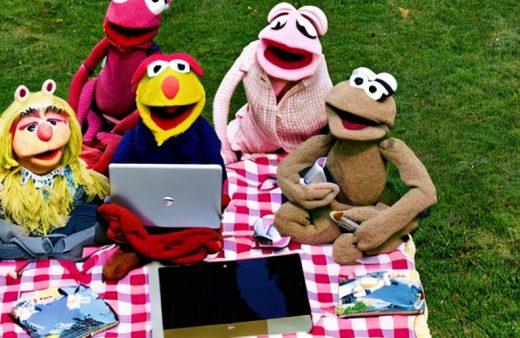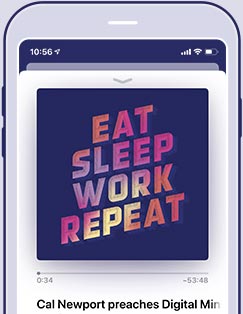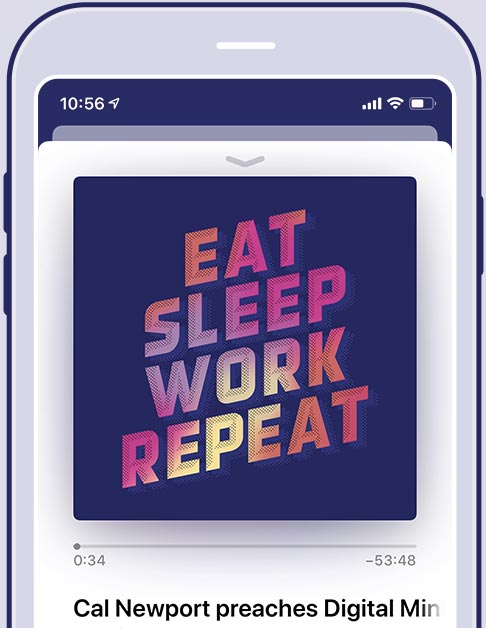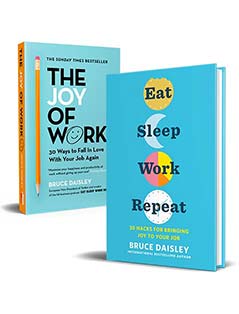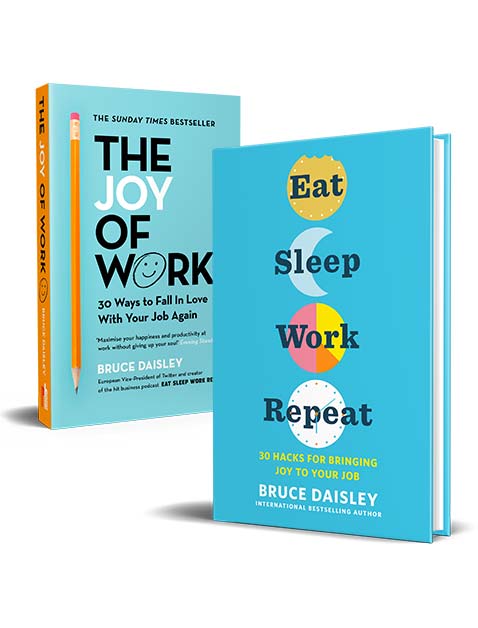Friends and Flow
Full transcript of Richard Reeves below.
Our first episode with guests Sue Todd – founder of culture consultancy, Wonder – and Richard Reeves – author of Happy Mondays.
Links to what we discuss:
Happiness by Design – Paul Dolan
The Organised Mind by Daniel Levitin
Full transcript
- Having a friend at work is vital to being happy at work
- Bosses should set out to ‘do no harm’
To kick off thanks for talking to me today. I’m interested really in your perspective what actually makes us happy at work.
RICHARD REEVES: I think the findings of recent research support the idea that actually personal connections, social capital whatever you want to call it. There’s been lots of books about social networks, social capital, community. So I was always struck by the finding that one of the best predictors of someone’s happiness at work was the answer to the following question: do you have a close friend at work? And so one of the things that predict how people feel at work is a very human sense of connectedness to people. Are you are you friends with someone. Do you feel a sense of community. That kind of social connection is very important. So I’ve always said that bosses who attentive should never tick people off for chatting by the water cooler, they should never cancel the Christmas party. They should see those social ties in the workplace now as incredibly important for people’s sense of well-being and motivation for coming to work. And because those seem to be some of the key things.
Then the other side of it is a respectful and good relationship with your boss. Actually the thing that makes people most unhappy at work tends to be the relationship with their boss. So your colleagues make you happy. Your boss makes you unhappy if they get it wrong. Your boss isn’t maybe not the primary way to be happy at work but it’s very important that they don’t make you unhappy.
That relation to the boss and respect and communication from the boss. As people get more senior recognising their own power over somebody else’s sense of well-being and happiness at work. They don’t realise that just one word here or a glance there or a joke or kind of whatever can actually have a really negative impact on wellbeing. And so I’d say strength of your relationship with your colleagues, a good and respectful relationship with your boss and then thirdly the sense of purpose in your work. That’s a very vague way to put it. But actually people have to feel as if what they’re doing (at whatever level of your organisation) is contributing to an aspect of the organisation that they understand. The apocryphal story of the cleaner at NASA, asked what he did by the visiting President: “I help put men on the moon”. I’ve never been able to stand up that story, in fact, but it doesn’t kind of matter if it’s true or not because it contains a truth which is that’s exactly what you want. The sense of whatever I’m doing I can connect what I’m doing to a organisational goals. I think those are the three key ingredients happiness at work I’ve always thought that and I still think that.
Quite often anything that’s about work culture and talking about work culture and happiness at work tends to be about the leader’s role and the importance of a leader whereas quite often in work environments I’ve been in that have been positive have actually almost been despite the leaders. Or it’s been about this collective sense of community. How important do you think the leadership is, I guess more and more – to your purpose point – we’re seeing companies trying to create a either truthfully meaningful purpose or trying to fashion one. And so you’ve got an increasing focus on high leadership credentials in terms of building culture. And then this obsession with purpose and I just wonder how powerful those two things are in balance.
RICHARD REEVES: I think that the relationship between leadership and happiness at work is an indirect one. It’s a mistake for leaders to directly set out to make their people happy. That’s like parents who say I just want her to be happy. Never true. You know it’s what parents is there’s always something else they want to be. A boss who says I just want people to be happy that is not a good boss. The boss’s role – as I’ve said – is first of all to not their staff unhappy. So not be a negative presence – that’s harder than it sounds – given the relationship. And secondly to create a culture in which those other relationships, the sense of camaraderie can can be created. I think you’re right that actually sometimes bad leaders inadvertently create happier workers from what we would call as Brits a “Blitz Spirit’: we’re all in this together. United by your hatred of the boss. And that’s one way to get happiness. But I would say that’s A probably quite short term that in the long run you know it’s actually quite hard to sustain, that a crisis response to “we’re all in this together”. And secondly I don’t think it will add to the success of the organisation as much as the other kind of happiness which is happiness because you know what the purpose of the organisation, you’re clear about your role and you’re allowed to get on with it. And so I see leadership as about creating a culture in which those relationships can thrive and setting clear purpose makes it clear what are you’re there to do. But not to see themselves as the happy evangelist themselves. That won’t work and can backfire. In the end that’s not really the role of leaders to create happy workers is to create a purposeful organisation in which people have respectful relations and a chance to form relations with each other. The result of all that will be happier workers but they shouldn’t be aim directly at it. I’m a Mill scholar. One of my favourite quotes from Mill is that “happiness is best approached like a crab, sideways”. I love that quote because I think it’s exactly right I think if you set to create a happy workplace I think that’s a mistake. I think what you do if you set out to create a respectful, purposeful, rich in social capital workplace and the result will be happiness as well as profits and you need both.
And it is there is there any change in the way that work actually exists now. So one of the things I was I was revisiting some of the things you’ve worked on and this is a wonderful programme ‘Making Slough Happy’. One of the findings from that – and it’s well established – is that when people are in a state of flow, when people are consumed with the activity they’re doing actually that can create happiness. And it seems for most people now work is like the antithesis of flow. It’s like this series of constant interruptions. A job that consists of answering e-mails, it’s like the opposite of flow. And I just wonder if modern work is less compatible with happiness or has it just evolved in a different way.
RICHARD REEVES: Very interesting question. The original finding from Mihaly Csikszentmihalyi who wrote Flow (and you get extra points for being able to say the name, that took me a long time to learn. And you sound so much more credible if you can say it properly). His book Flow actually found that counterintuitively people are more likely to be in flow at work than they were outside work. And so engaging in a task that you find engaging and absorbing – the kind of task was secondary, and getting more skilful at whatever the task was. That was part of the thing that led me to do my original work around around happiness and work. And saying that this whole idea that work is bad, the whole ‘Thank God it’s Friday’. ‘I work to live, I don’t live to work’ stuff which I found incredibly unhelpful. The truth is that work can be a great source of happiness and Csikszentmihalyi’s work suggests that. However since then there has been a change in the pattern of work and there has been this kind of constant interruption. We live in a kind of interruption culture now and I don’t know any evidence on this but the really interesting question as to whether that reduces your chance of getting into the kind of follow that work can offer you and has historically offered you because of this constant interruption. We do know there is evidence that it’s very hard to re-engage the previous task if you constantly being bounced from to the other. There’s a thing called transition time required to move one task to another is quite high. So if you’re bouncing around then actually your productivity will come down and I think there’s some some evidence that’s beginning to affect people’s sense of well-being, through that sense of breathlessness that comes with constant communication.
In the period since you wrote Happy Monday, the 15 years since then the evolution of what work actually looks like is almost unrecognisable to some extent it would be fascinating to revisit that.
RICHARD REEVES: Yeah that’s right. And actually I was relatively upbeat about the role of technology in Happy Mondays and the other work, because I think it has the potential to liberate people from the being desk slaves because you can do work from different places it has that potential to be quite liberating (it also has a potential to be quite enslaving because you can never escape from it). And that was the challenge. What I didn’t anticipate and haven’t really thought through enough yet is how the pace of communication, the kind of communication, the rise and importance of social media. People have kind of working in those sorts of instant messaging within a company and so on. I didn’t anticipate the pace and the way that changed the nature of work itself. What I thought about was how technology would allow you to work from different places at different times. But I actually think the very nature of work itself and the requirement to to be instantly available and to instantly respond – instant messaging kind of tells you everything – that needs to be instantaneous I think changes changes the relationship between work and technology. I would say that I’m probably 20 percent less bullish about what technology is doing and I was 10 years ago for the reasons you’ve just identified.
It’s fascinating to explore it I checked to Richard Layard, the professor of happiness, I think Lord Layard now. And he was describing how it’s demonstrable that there are more people with mental health issues or more people with depression than they were 50 years ago. And we can track that. And it be interesting then to extrapolate that forwards not with a necessarily pessimistic view but is technology going to resolve that or enhance that – especially through the prism of work. Like you say: unanswered.
RICHARD REEVES: I think that’s right. But the other thing that’s happened and it is this the slightly sideways way to take the argument but actually technology has also improved the quality of leisure. There’s interesting work now in the U.S. new research showing that the rise in the number of hours that young men in particular when playing videogames (when they’re generally not in the labour market). Those video games are amazing, they’re incredibly high quality games. I have kids, I always say to people who get too preachy about this: play Star Wars Battlefront for a couple hours then get preachy about it. And I think there’s a really interesting flipside of technology. It has made leisure for a lot of people more interesting, more fulfilling. If somebody is playing a high quality video game online – with friends or whatever – they’re in flow. And if the choice is between that and a relatively low skilled, low paid job then maybe leisure becomes more interesting. So I think that’s another thing I didn’t anticipate as well which is how technology can increase the value of leisure for people. And at relatively low costs as well. You know I think it’s not it’s not irrational to think that someone might say you know what at least for a while I’m going to have much more fun getting really good at Halo or Star Wars Battlefront or whatever than I am going to be stacking shelves in a grocery store. I’m not saying that’s the right decision to make. I’m saying it’s not necessarily irrational. I think we’re beginning to see how technology is really changing the way we think about work and leisure.
Fascinating. And I guess that’s what you were previously doing outside of work was just watching TV. Which is this fairly passive thing and then something that’s more active and involved and stimulating.
RICHARD REEVES: And you get better at it. And so you know the sort of middle aged reaction ‘oh you’re just wasting your time playing video game’. Well is it a waste of time? Life’s less boring outside work now. So we better think about how boring work is think. The quality of work is going to become a really important issue here.
Is there anything that you think employers or companies can do? If you’ve got a sideways view of happiness does that mean you don’t have a culture department or you don’t have someone who’s responsibility it is or just maybe they don’t signal what they’re doing as clearly?
RICHARD REEVES: I think I’m slightly following Richard Layard’s lead. This may not sound as noble or exciting but ensuring that you’re not making people unhappy. Actually getting out of the way. Finding out the things that get in the way of people’s sense of well-being at work. And those I think include sort of the things that people can find frustrating or energy depleting. I think quite a bit of our energy at work. Energy has a lot to do that wellbeing. When I give talks on energy at work I ask people ‘what are the things that happen at work that most deplete your energy? That reduce your energy?’ And the thing that gets shouted out every time is ‘meetings’. I have this theory the reason why meetings always have coffee and biscuits in them is because they’re sucking so much energy out. You kind of have to put energy back in just to survive the meeting. That’s incredibly detrimental to people’s sense of happiness. Actually people don’t want to waste their time. People generally don’t like to spend their time on purposeless activities. So just finding out what’s making people unhappy. I’ve already mentioned the role of leaders and bosses and kind of not making people unhappy.
RICHARD REEVES: So I think, first of all: do no harm. I think that’s an incredibly important principle. What are the things that make people unhappy? Stop doing them.
And then I think in terms of kind of promoting happiness. As I said think that’s indirect but it is around. Clear sense of purpose. Clear sense of respect. Build and nurture social capital. Celebrate friendships and relationships within the workplace (rather than making people feel bad about them.
Judge people by their performance rather than their place and their time. But that’s incredibly empowering people give people maximum flexibility even if some people abuse it. They’re a tiny minority. And for most people it’s worth the trade-off.
Trust. If people feel trusted that hugely predicts how happy they feel at work.
And so I think there’s a combination of don’t get in the way and don’t do bad stuff. Obama has a thing about foreign policy: ‘don’t do stupid stuff’. I think that applies in workplace wellbeing too.
Then create a purposeful organisation with a culture.
For God’s sake don’t have a happiness department.Don’t have a happiness evangelist. Don’t say we’re going to make everybody happy because that will immediately provoke a scepticism from a lot of people and it doesn’t empower people enough to kind of create their own circumstances. You’re a facilitator of your employee’s happiness and well-being rather than a direct creator of it. But nonetheless a hugely important contributor to your bottom line. And that’s where I think culture is important. So yeah it’s fine to be thinking about culture but be quite hard headed about what that means rather than coming across too soft. Ironically although happiness other needs seems quite soft concept, I actually think it requires quite hardheaded management in order to bring them about.
Companies often get into the trap of thinking happiness is about a fridge full of smoothies and a ping pong table. A lot of people when they describe what was their perfect work in the past they describe something that actually has very little assimilation of different groups. Marissa Mayer at Yahoo describes the culture that made Google a success. She said it’s 100 hours a week. Obviously it’s very difficult to accommodate a diverse demographic group and ask people to work 100 hours a week. There are interesting reinventions in notions of culture.
RICHARD REEVES: You make the mistake in thinking, even if there’s a correlation thinking it’s in any way causal. What was creating well-being in those places was the incredible sense of excitement of being part of a start-up and they self selected the kinds of people who wanted. Who wanted to be turbocharged and work all the time. I can totally see how that would create happiness. But those are the exceptional workplaces. Most people are not going to work at Google or Yahoo. And they’re not going to work in a start up. Now a start-up is a completely different type of environment. There it partly is entrepreneurial and it’s uncertain and you attract the kind of people who like all of that stuff. And if they do like it they’re going to like that environment. I think actually the bigger challenge is for the vast majority of people who don’t work in those places and we shouldn’t allow the glamour and the profile of those companies to fool us into thinking ‘they’ve got a ping pong table maybe we’ll be happy if we do that’. Because the thing that made people were happy there was not the ping pong table. And in most organisations I think the the secret to happiness for workers turns out to be the secret of good management and strong leadership. You know it’s not smoothies, as you say, it’s just manage people, well leave the organisation clearly, have purpose and clarity about what you do, have good clear processes. And it sounds incredibly boring but I think it turns out that, you know what, good management is that be good for happiness too.




